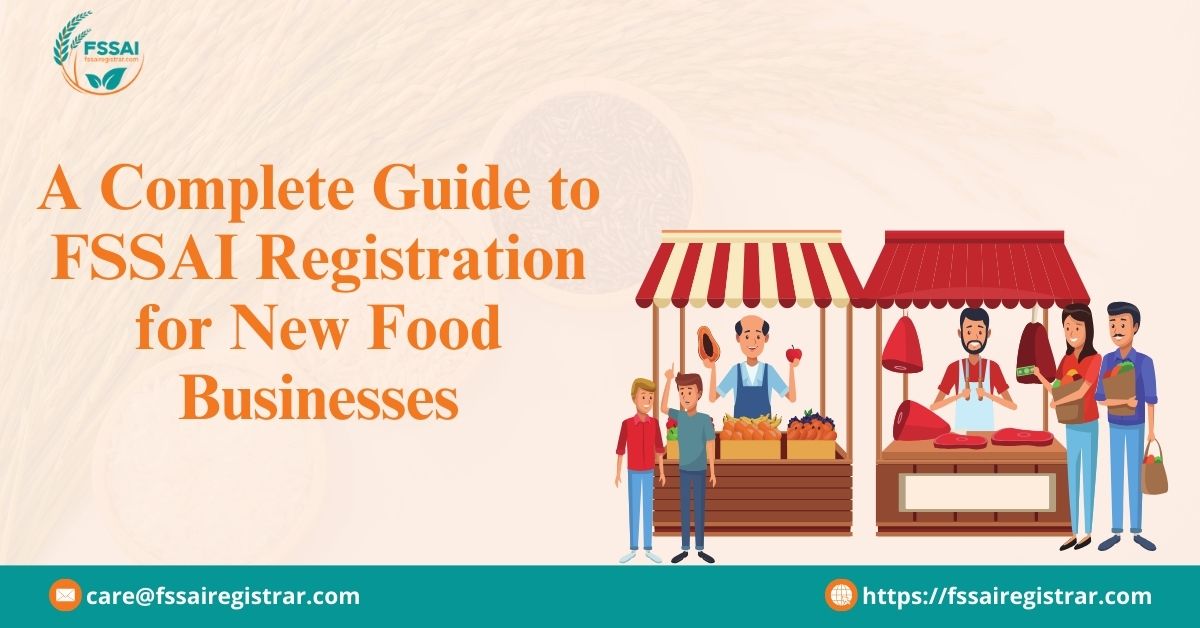In India, the food industry is one of the most rapidly growing sectors, attracting new entrepreneurs and investors. With the increasing demand for safe and high-quality food, the government has implemented stringent regulations to ensure that consumers have access to safe, wholesome food. The Food Safety and Standards Authority of India (FSSAI) is the primary regulatory body responsible for ensuring the safety and quality of food products in the country. For new food businesses, obtaining FSSAI registration is not just a legal requirement but also a crucial step in building trust with customers and ensuring long-term success. This guide provides a comprehensive overview of FSSAI registration, including its importance, types, eligibility criteria, registration process, and the benefits it offers to new food businesses.
What is FSSAI?
The Ministry of Health & Family Welfare, Government of India, established the independent Food Safety and Standards Authority of India (FSSAI). It was formed under the Food Safety and Standards Act, of 2006, with the primary objective of laying down scientific standards for food products and regulating their manufacture, storage, distribution, sale, and import to ensure the availability of safe and wholesome food for human consumption.
Importance of FSSAI Registration for New Food Businesses
FSSAI registration is mandatory for all food-related businesses in India, regardless of their size or scale. Whether you are running a small home-based bakery or a large food processing unit, you must obtain FSSAI registration or a license to operate legally. Here’s why FSSAI registration is important for new food businesses:
Legal Requirement: FSSAI registration is a mandatory legal requirement for all food businesses operating in India. Non-compliance can result in hefty fines, penalties, and even the closure of the business.
Consumer Trust: FSSAI registration acts as a mark of assurance to consumers that the food they are consuming is safe and meets the required quality standards. It helps in building consumer trust and brand loyalty.
Market Access: Many e-commerce platforms, retailers, and distributors require FSSAI registration before they agree to stock or sell a food product. It opens up avenues for new food businesses to expand their market reach.
Product Labeling: FSSAI registration is essential for food labeling. It ensures that the labels on food products are accurate and informative, providing consumers with necessary details such as nutritional information, ingredients, and expiry date.
Export Opportunities: For businesses looking to export their food products, FSSAI registration is a prerequisite. It helps in gaining the necessary certifications required for exporting food products to other countries.
Quality Assurance: FSSAI ensures that food businesses follow strict hygiene and safety standards, reducing the risk of foodborne illnesses and ensuring the quality of food products.
Types of FSSAI Registration
Depending on the size and type of the food business, FSSAI offers several registrations and permits. Understanding these types is crucial for new businesses to ensure they apply for the correct registration.
-
Basic FSSAI Registration:
-
Eligibility: Small food businesses with an annual turnover of less than INR 12 lakhs are required to obtain basic FSSAI registration.
-
Examples: Home-based food vendors, small retailers, petty food manufacturers, etc.
-
Registration Process: This is a straightforward process where the business owner needs to fill out Form A (Application for Basic Registration) and submit it to the local FSSAI office.
-
-
State FSSAI License:
-
Eligibility: Food businesses with an annual turnover between INR 12 lakhs and INR 20 crores are required to obtain a state FSSAI license.
-
Examples: Small to medium-sized manufacturers, storage units, transporters, retailers, marketers, etc.
-
Registration Process: The business owner must submit Form B (Application for State License) along with the required documents to the state FSSAI office.
-
-
Central FSSAI License:
-
Eligibility: Large food businesses with an annual turnover of more than INR 20 crores or businesses engaged in food import/export or operating in multiple states need to obtain a central FSSAI license.
-
Examples: Large manufacturers, importers, exporters, large storage units, etc.
-
Registration Process: The business owner must submit Form B (Application for Central License) along with the necessary documents to the central FSSAI office.
-
Renewal of FSSAI Registration
FSSAI registration is not a one-time process. It needs to be renewed periodically to ensure that the food business continues to comply with the food safety standards. The renewal process is similar to the initial registration process and should be initiated at least 30 days before the expiration of the current registration/license.
Benefits of FSSAI Registration for New Food Businesses
Obtaining FSSAI registration offers several benefits to new food businesses, including:
Brand Recognition: FSSAI registration adds credibility to your food business and helps in establishing your brand in the market.
Consumer Confidence: With FSSAI registration, customers are more likely to trust your products, knowing that they meet the required safety and quality standards.
Legal Protection: FSSAI registration protects your business from legal issues and penalties, ensuring smooth operations.
Business Expansion: With FSSAI registration, your business can easily expand its market reach by entering new markets, including e-commerce platforms and export markets.
Compliance with Regulations: FSSAI registration ensures that your business complies with all food safety regulations, reducing the risk of legal complications and enhancing your business’s reputation.
Note: Click here to Re-New your FSSAI certificate now – RENEW FOOD LICENSE CERTIFICATE
Conclusion
FSSAI registration is a crucial step for any new food business in India. It not only ensures compliance with legal requirements but also helps in building consumer trust, expanding market reach, and enhancing brand value. By understanding the types of FSSAI registrations, the registration process, and the benefits it offers, new food businesses can lay a strong foundation for success in the competitive food industry.

